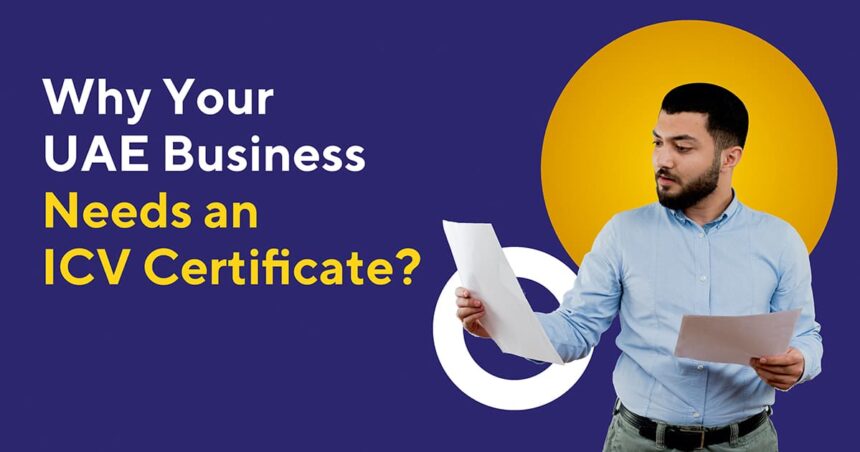The In-Country Value (ICV) certification program launched by the UAE government aims to promote local economic growth by encouraging suppliers doing business in the country to increase their contribution to the UAE economy. A key aspect of the UAE ICV certification program is the issuance of ICV certificates to suppliers, which evaluate their contribution based on several factors and assign an ICV score. This ICV score then impacts the ability of suppliers to win government tenders and contracts.
Impact of ICV Score on Pre-qualification for Government Tenders and Contracts
The Ministry of Industry and Advanced Technology (MOIAT) issues ICV certificates to suppliers after evaluating their ICV score based on various economic contribution parameters like Emiratization, procurement from local vendors, investments in the UAE and revenue generated within the country. Suppliers with a higher ICV score are then given preference and advantage during the award of contracts and purchases by government entities.
The key impact of the ICV score as per the tendering process is that government and semi-government entities notify MOIAT of all upcoming tenders and contracts. MOIST then issues a list of pre-qualified suppliers for that particular tender based on their ICV score and other compliance parameters. Only suppliers that feature in this pre-qualified list stand a chance of being shortlisted for the tender. This ensures that suppliers contributing more to the local economy get priority access to lucrative public sector contracts and tenders.
Impact of ICV Score on Technical Evaluation of Government Tenders and Contracts
The ICV score of suppliers is one of the primary criteria based on which the technical evaluation of government tenders and contracts takes place. Suppliers are required to submit their ICV certificate along with their tender proposals. The ICV score makes up a significant percentage of the overall technical evaluation – usually between 15-30%. So suppliers with a higher ICV certification have a clear advantage during the bidding process. Government entities are mandated to give preference to bids with a higher ICV score, all other evaluation criteria being equal.
Moreover, the ICV score also impacts contract awards in cases where two or more bidders obtain the same final technical and financial scores post evaluation. In such situations, preference is given to the bidder with the higher ICV score to break the tie. This provides a strong incentive for suppliers to focus on boosting their local economic impact in order to remain competitive for public sector work.
Impact of Minimum ICV Score Thresholds
For some government tenders and contracts, especially those aimed at development goals, a minimum required ICV score is specified. Only companies bidding for these projects need to have an ICV score that meets or exceeds the threshold score. Bids from applicants below the minimum score are rejected at an early stage without a full technical evaluation. By setting a minimum bar, these contracts help further the national ICV program objectives. Only suppliers proven to meaningfully contribute to the local economy through their ICV certification achievements can be awarded government tenders and contracts that support UAE development priorities. This screening process at the start eliminates bids that are not adequately aligned with the UAE’s ICV agenda.
Promotion of Local Businesses
The UAE ICV certification program aims to encourage strategic localization of priority sectors. As government contracts make up a major portion of spending in priority sectors like oil and gas, infrastructure, healthcare, the ICV score indirectly pressures suppliers to increase their local economic footprint. Suppliers know they need to continuously improve their ICV performance to remain competitive for lucrative public projects. This has succeeded in boosting local job opportunities and spending within the UAE over the past few years.
Ongoing Improvement in ICV Scores to Maintain Government’s Confidence
The ICV score is also a factor in contract extensions and renewals. Even after securing government tenders and contracts, suppliers must maintain or improve their ICV performance to retain the government’s confidence. Periodic evaluations may be conducted where a significant drop in ICV score could jeopardize future work. This encourages ongoing localization rather than a ‘one-and-done’ approach solely to win the original government tender. Suppliers are incentivized to continually invest in the UAE economy for the long-term.
In conclusion, the UAE ICV certification program has redefined supplier engagement with the government by linking scores to tender pre-qualification, technical evaluations, and minimum thresholds. This strategic approach not only boosts local businesses and job opportunities but also incentivizes continuous improvement for securing government tenders and contracts. The program serves as a key tool aligning economic growth with government procurement, ensuring a sustainable commitment to the UAE’s development goals. Suppliers should prioritize enhancing their ICV scores and seek guidance from ICV consultants to maximize opportunities and comply with evolving program requirements


